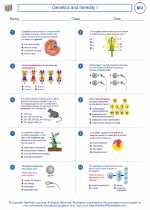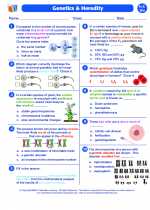Prokaryotic Cells
Prokaryotic cells are a type of cell that lacks a distinct nucleus and other membrane-bound organelles. They are found in bacteria and archaea, which are both unicellular organisms. Prokaryotic cells are simpler in structure compared to eukaryotic cells, which have a true nucleus and membrane-bound organelles.
Characteristics of Prokaryotic Cells:
- No Nucleus: Prokaryotic cells lack a true nucleus. Instead, their genetic material is located in the nucleoid region, a central area within the cell where the DNA is concentrated.
- No Membrane-Bound Organelles: Unlike eukaryotic cells, prokaryotic cells do not contain membrane-bound organelles such as mitochondria, endoplasmic reticulum, or Golgi apparatus.
- Cytoplasm: The cytoplasm of prokaryotic cells contains ribosomes, which are involved in protein synthesis, as well as various enzymes and molecules necessary for cellular processes.
- Cell Wall: Most prokaryotic cells have a rigid cell wall outside the cell membrane, providing structural support and protection.
- Capsule and Pili: Some prokaryotic cells have a capsule, a protective layer outside the cell wall, and pili, which are hair-like appendages that aid in attachment to surfaces.
Study Guide:
When studying prokaryotic cells, it's important to understand their structure, function, and differences from eukaryotic cells. Here are some key points to focus on:
- Describe the structure of a prokaryotic cell, including the cell membrane, cell wall, nucleoid region, and any additional structures such as capsules and pili.
- Explain the function of each component within a prokaryotic cell, such as the role of the cell wall in providing support and protection.
- Compare and contrast prokaryotic cells with eukaryotic cells, highlighting the differences in cellular organization and organelles.
- Discuss the ecological and practical significance of prokaryotic cells, such as their role in nutrient cycling, disease-causing abilities, and industrial applications.
- Explore the diversity of prokaryotic cells, including differences between bacteria and archaea, as well as variations in metabolic capabilities and habitats.
Understanding prokaryotic cells is fundamental to grasping the diversity of life on Earth and their impact on various ecosystems. It's also essential for comprehending the basic principles of microbiology and biochemistry.
.◂Biology Worksheets and Study Guides High School. Genetics and heredity I
Worksheet/Answer key Genetics and heredity I
Genetics and heredity I  Worksheet/Answer key
Worksheet/Answer key Genetics and heredity I
Genetics and heredity I  Worksheet/Answer key
Worksheet/Answer key Genetics and heredity I
Genetics and heredity I  Worksheet/Answer key
Worksheet/Answer key Genetics and heredity I
Genetics and heredity I  Vocabulary/Answer key
Vocabulary/Answer key Genetics and heredity I
Genetics and heredity I  Vocabulary/Answer key
Vocabulary/Answer key Genetics and heredity I
Genetics and heredity I  Vocabulary/Answer key
Vocabulary/Answer key Genetics and heredity I
Genetics and heredity I  Vocabulary/Answer key
Vocabulary/Answer key Genetics and heredity I
Genetics and heredity I  Vocabulary/Answer key
Vocabulary/Answer key Genetics and heredity I
Genetics and heredity I  Vocabulary/Answer key
Vocabulary/Answer key Genetics and heredity I
Genetics and heredity I  Vocabulary/Answer key
Vocabulary/Answer key Genetics and heredity I
Genetics and heredity I 

 Worksheet/Answer key
Worksheet/Answer key
 Worksheet/Answer key
Worksheet/Answer key
 Worksheet/Answer key
Worksheet/Answer key
 Vocabulary/Answer key
Vocabulary/Answer key
 Vocabulary/Answer key
Vocabulary/Answer key
 Vocabulary/Answer key
Vocabulary/Answer key
 Vocabulary/Answer key
Vocabulary/Answer key
 Vocabulary/Answer key
Vocabulary/Answer key
 Vocabulary/Answer key
Vocabulary/Answer key
 Vocabulary/Answer key
Vocabulary/Answer key

The resources above cover the following skills:
LIFE SCIENCE (NGSS)
Heredity: Inheritance and Variation of Traits
Students who demonstrate understanding can:
Ask questions to clarify relationships about the role of DNA and chromosomes in coding the instructions for characteristic traits passed from parents to offspring.
Apply concepts of statistics and probability to explain the variation and distribution of expressed traits in a population.